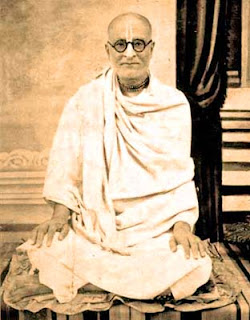The One Absolute

by Śrīla Bhaktisiddhānta Sarasvatī Ṭhākura Prabhupāda
Śrī Kṛṣṇa Caitanya told us that we should first acquire self-determination, without which we will mistake the mind for the soul. Mind is quite different from soul. The mind conducts all the activities of the physical plane. It receives impressions from Nature through the medium of the senses and through the functions of our body, that is, through the mind’s interfacing with external objects, which are made of matter.
Although we are habitually occupied with matter, when we begin to study theism, that is, when we enquire about the actual figure of Godhead, we find within the four seed verses of Śrīmad-Bhāgavatam (catur-ślokī bhāgavatam) the words that the Absolute Fountainhead spoke to Lord Brahmā, the creator of this material universe:
“If I am to bestow My mercy upon anyone, I must reveal Myself to him fully. Those with wayward aspirations and minds that tend to speculate will be debarred from attaining unobscured perception of My actual size, figure and colour. If I do not confer My mercy upon them, they will simply miss Me all together.”
In light of this, Śrī Kṛṣṇa Caitanya has disparaged all mundane thinkers, who are busy with grand philosophies or diligently adhering to their mundane ethics, along with all those who propagate their own humanitarian enterprises.
We find in the writings of our ācārya’s that, in essence, “No one should wrongly consider that when we speak of Śrī Kṛṣṇa we are speaking of an entity who is wholly different from Śrī Rāmacandra. The fact that we talk of Śrī Kṛṣṇa does not mean we are differentiating between Śrī Kṛṣṇa and Śrī Rāmacandra, for Śrī Rāmacandra and Śrī Kṛṣṇa are not essentially different entities. They are identical. But just as in this world, the perverted reflection of the transcendental plane, we find that a single man considers himself to be the father of one person, the son of another and the physician of someone else, in the transcendental realm, also, we find that the same, one Absolute appears in manifold aspects.”
So let no one imagine that we are talking of wholly different objects when we mention the avatāras. Vāsudeva is the same as Lakṣmī-Nārāyaṇa; Lakṣmī-Nārāyaṇa is identical with Sītā-Rāma. Sītā-Rāma is the same as Rādhā-Kṛṣṇa. We do not find any differences between them. There should not be any controversy in this matter, and, aside from their respective planes of rasa, there is no scope to draw a distinction between Śrī Kṛṣṇa and Śrī Rāma.
* * *
We simply want to appreciate the respective positions of the One Absolute and we have no ambition to change our position. Still, we must strive to render all possible confidential services to the Over-soul, and there is no harm in this. Yet in relation to Rāmacandra we find that in one kind of worship all of our activities cannot be one hundred percent engaged for Him. In another, only some portion of our activities are engaged in serving the entity of our adoration, while the other portion is kept aside for our selfish, personal use. These kinds of worship are not perfectly selfless.
We often find in this world that a man believes himself to be the master of a range of subordinate properties. He proclaims, “I have many servants,” “I have a large estate,” “I have great learning,” and so forth. It would not really be compatible with human nature were a man to confine himself to a single aspect of an entity, for then he would have nothing to do with the other aspects of that same entity.
To be continued

Comments